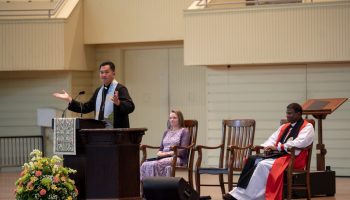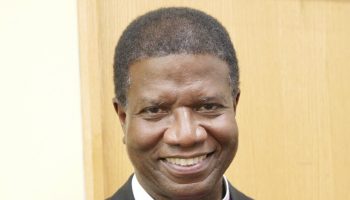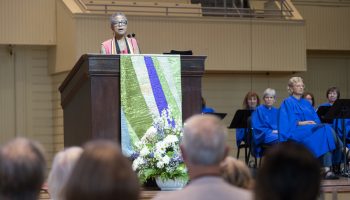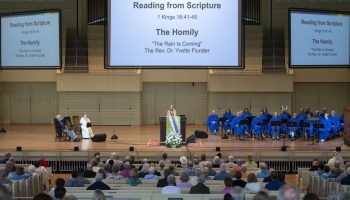“America is always obsessed with the pursuit of happiness; we are committed to the pursuit of happiness. That is why so many of us left our country of birth,” said the Very Rev. Alan Jones at the 10:45 a.m. Sunday morning worship service in the Amphitheater. The title of Jones’ sermon was “Obsessed with the Pursuit of Happiness — The Energy of Invention!” The Scripture readings were Genesis 12: 1-4a and John 3: 16-17.
“All is not well in paradise,” he said.
The 2015 World Happiness Report published by the United Nations placed the United States at 15. Out of 158 nations, Switzerland was first and “Burundi and Togo were at the bottom of the list.”
Chautauqua Institution is a generous invention of the human imagination, Jones said. In the Old Testament reading, God called Abram to go out and become a great nation, and in 1 Peter in the New Testament, the writer says, once you had no identity but now you are God’s people.
Yet, we are on a hedonic treadmill, Jones said, and we only add more disappointment to our lives.
“Resentment runs deep in our culture,” he said. “(François de La) Rochefoucauld said that there is something about the misfortune of others that does not leave me displeased. American exceptionalism is hard work but being in competition is a set-up. No wonder we are unhappy.”
The good news, he said, is that “life is not about you.”
“That should be a relief,” he said. “There is a drama other than your own psycho-drama. It doesn’t take away your drama but it puts it into perspective. The question is what story are you telling yourself.”
Jones urged the congregation to let go of the cluttered self and learn to live with the broken and fragmentary, to pay attention to inner longing.
The ground of innovation is love, he said. If we miss this, we see enemies, we look for someone else to blame. Who do we blame for our fear or hate?
“I know two things and everything else is footnotes, although I do love my footnotes,” he said. “Everyone matters and we are in this together. I can’t be me without you. As Ram Dass said, ‘When all is said and done, we’re just all walking each other home.’ ”
The world needs to move from “sciencia” to “sapiencia,” from science to wisdom, from stuff to what matters, from facts to meanings. A fact can be technically true and put together with other facts that are technically true and still be in service to a lie, Jones said.
Astronomy has shown us how we can change our minds, he said. Before 1543, everyone knew the earth was at the center of the universe. Nicolaus Copernicus came along and said that more accurately the sun is at the center and Earth is just a mere planet.
“If you can demote the earth, think what you can do with a pope or an emperor,” Jones said.
Then in the 1920s, we found out that we were in the suburbs of our galaxy and our galaxy was just one of 100 million.
“Why do we think we are significant?” Jones said. “Now we are learning that the universe is made up of dark matter, not the ordinary matter we know about.”
Jones suggested that the human race has to go on a pilgrimage like Abraham to learn what it means to be a blessing. We have to learn how to invent human-to-human interaction without it being a power play, without freedom mistaken for nihilism.
“The truth is that we construct our lives by story,” Jones said.
In The Thanatos Syndrome by Walker Percy, Tom More, the psychiatrist, believes that people should live with their terrors because the terrors are telling them something about life. The scientists in the book ask, “Why not take drugs, why not invent humans who are manageable, who can be gratified without being arrested?” But in the end, individuals get flattened out by culture.
Jones said we learn the old saying that “sticks and stones break bones but words will never hurt.” He told of being at a conference at Aspen and was partnered with a woman to talk about their lives. She remembered at 11 years old waking up and going into her mother’s room and her mother saying, “ ‘Get out of here, you make me sick.’ That was the dominant story of her life and it was powerful and dangerous.”
He also told the story of New Zealand author Katherine (Kathleen) Mansfield, whose parents left her and her siblings with their grandmother when they traveled to England. When her mother returned after eight months, the first things she said to Kathleen was “Well, Kathleen, I can see you are as fat as ever.”
“Words can make or break us,” Jones said. “God’s word to you is love and delight. God’s most accurate word to you is ‘I love you.’ The most real thing about you is that you are loved.”
For the early Christians, the word was joy, that something had happened to them that determined who they were. The good news, he said, is that there is an alternative to our oppressive story if we are open to divine inventiveness.
God is an artist and the world has no functional end but God’s love and delight of it, Jones said. Sic Deus dilexit mundum: God so delighted in the world. There is no other point but delight, and love is the story.
He told the congregation they don’t have to believe it. He said, “You don’t have to justify yourself; you are made out of joy, not utility. You were made for the pleasure of it.” It is God’s power that allows us to be ourselves. Sheer joy needs company.
What is the word that is pulling at your soul? he asked.
“Is it ‘Get out’ or ‘You are fat’ or is it a word of community where no one is left out?” he asked. “Shut your eyes and imagine God’s delight. We can invent and celebrate a world worthy to delight in. Sic Deus dilexit mundum. You are God’s joy; go out and invent the world.”
The Rev. Robert M. Franklin, Jr., director of the Department of Religion, presided. James A. Pardo Jr., chair of the Chautauqua Institution Board of Trustees, read the Old Testament Scripture and Shannon Rozner, longtime friend of President Michael E. Hill, read the New Testament lesson. Jared Jacobsen, organist, choir director and director of sacred music, led the choir. The organ prelude was “Vision of the Church Eternal” by Olivier Messiaen. The hymn-anthem was “Beautiful River” by Robert Lowry, festival arrangement by John Rutter. James Paterniti played “Taps” at the end of the Prayers of the People. The anthem was “Abide with me” by William Henry Monk, arranged by Molly Ijames and the offertory anthem was “I was Glad” by Charles Hubert Hastings Parry based on Psalm 122. The organ postlude was “Final” (Symphonie I, vi) by Louis Vierne. The Samuel M. and Mary E. Hazlett Memorial Fund and the J. Everett Hall Memorial Chaplaincy provide support for this week’s services.




